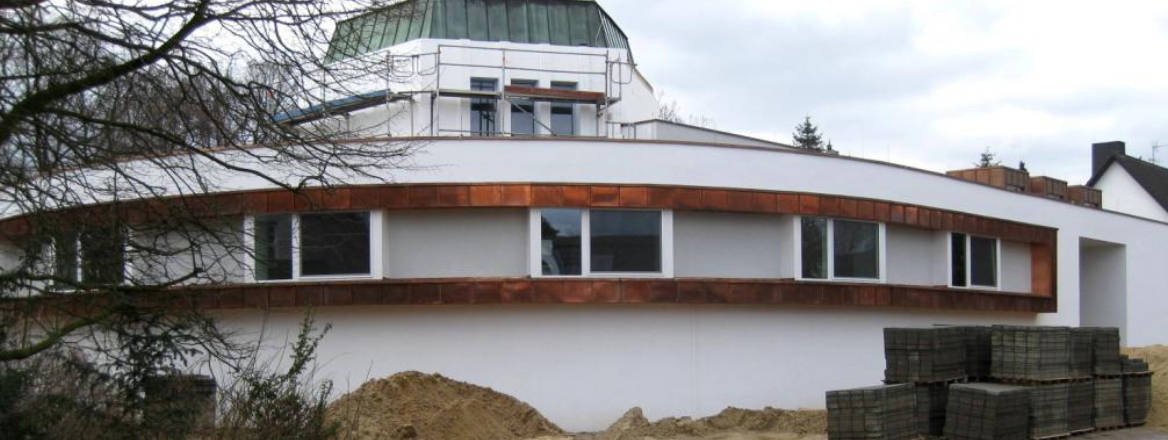What the UK Reserves can Learn from a German Synagogue Architect
Public appearances matter, and may promote recruitment. Just ask a German synagogue architect.
In the UK, as in many Western countries, the public worships the armed forces without having much idea of what they actually do. This alienation is dangerous; a democracy needs its armed forces to be part of the community they serve. To remedy that civil–military divide, the UK armed forces could do worse than draw inspiration from a German architect specialising in synagogues.
When the UK is not under lockdown, I walk to and from work in central London every day. Every day I pass – twice – a British Army reserve facility. I see the sign on the building, but I have no idea what the building looks like. The only visible part is a windowless wall with a front that features a small door, which is always locked. The sign on the front encourages people to apply, but I have never seen anyone not wearing uniform enter the building. Occasionally, though, I see a soldier or cadet. That happened again just a few days ago, when a soldier suddenly climbed out of the small door as I walked past.
Other reserve facilities, even those located on busy city streets, are similarly secluded. Active-duty soldiers, in turn, operate out of mega-bases, likewise separated from the public. There is a very valid reason for this widespread absence of the UK armed forces from public life, not counting their ceremonial appearances: IRA and Islamist terrorism has turned soldiers into targets. But the armed forces’ absence from daily life is harmful both to them and to society, as it enforces the false idea that they’re different from the rest of society. A 2018 YouGov survey on behalf of the British Legion, for example, found that 80% of Britons feel that the UK armed forces make a valuable contribution to society – but 69% didn’t know what the armed forces do on a day-to-day basis. 44% thought that they run fitness bootcamps for the public, while 16% thought they perform as movie extras. With more than two-thirds of the public not knowing what the armed forces actually do, it’s no wonder both the reserves and the active-duty forces struggle with recruitment.
The reserves should, I submit, make the acquaintance of Alfred Jacoby. There’s a reason Professor Jacoby is not well-known in military circles: he’s an architect specialising in synagogues. After Germany’s reunification in 1990, large numbers of Jews from former Warsaw Pact countries settled there, adding to the country’s small but growing post-Second World War Jewish community. That created a sudden need for new synagogues. Jacoby, who is himself Jewish and was born in Germany in 1950, decided that the architecture for the new synagogues should be different from that of traditional ones: they should be bright and airy, featuring large windows. The large windows, he explained to me when I interviewed him as a journalist 20 years ago, were a vital aspect: they allowed the Jewish congregations to look out at society and feel part of it, and the Germans to look into the synagogue and see that there was nothing dark or strange about what was going on inside. Older synagogues, by contrast, are imposing buildings with small windows. For ill-intentioned people, it’s easy to entertain destructive thoughts about the activities going on inside, and for others it’s easy to presume that the people inside are ‘different’ from everyone else.
Though I am not suggesting that today’s British reserves facilities are like German synagogues in the 1930s, Jacoby’s approach is a useful point of reference. Imagine if these facilities were refashioned like his synagogues: with large windows, open to the community (with appropriate security provisions, of course), reminding those inside that they’re part of a wider community and encouraging engagement with the wider public?
A major review of the UK’s reserve forces – Reserve Forces 2030 – is currently underway, led by former Defence Minister Mark Lancaster. Naturally, the review will focus on how to make better use of the skills of current and future reserves. Should the armed forces tap into reserves’ civilian expertise to a much larger extent than is the case today? Should it be possible to have two careers in the reserves, perhaps a first one in a traditional military role and a second one utilising one’s civilian expertise? Fortunately, though, Lancaster and his team aren’t just looking to rearrange the deck chairs: they’re also trying to increase the reserves’ engagement with the wider public. That’s a laudable effort. Reserves are the natural bridge between civilians and the armed forces, but many of them strongly identify with the military.
That’s where Jacoby’s approach could be gainfully applied. Serving in the reserves should not be about climbing in through a small door to engage in activities unknown to the public. Instead, it should also be about serving national security in a wider sense. That begins with being visible and approachable. As for the buildings, large windows should just be the beginning. Reserve centres could, in fact, bring the community in too. For example, facilities could be shared with local gyms, scout groups, and community services such as drop-in medical centres. Sharing the space would not only help bridge the civil–military divide, but it would also help the reserves make good use of facilities they only use infrequently during the work week. In addition to nominal rent charged to such groups, the MoD could even rent out parts of their buildings to companies such as Amazon and charge them commercial rates, which would help pay for redesigns.
Such visibility would, in turn, aid recruitment. It should not come as a surprise that 44% of Britons think the UK armed forces run fitness bootcamps, when most members of the public never see any soldiers, sailors or airmen. Reserve facilities with inviting atmospheres and constant activity would go some way, therefore, to inspire those who have never considered any engagement with national security to join the reserves.
The views expressed in this Commentary are the author's, and do not represent those of RUSI or any other institution.
WRITTEN BY
Elisabeth Braw
Resident Fellow at the American Enterprise Institute (AEI)


